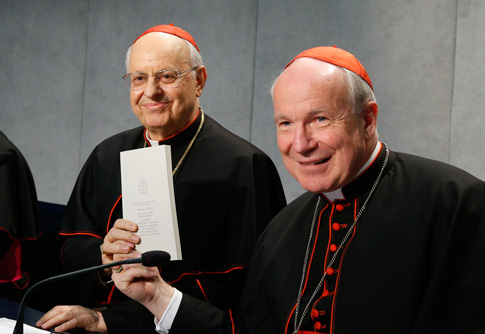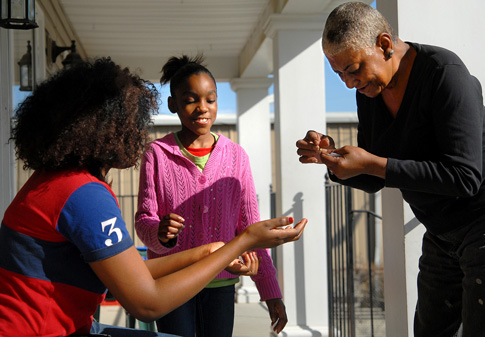By Cindy Wooden Catholic News Service

VATICAN CITY (CNS) – Pope Francis’ hymn to love and family life is more like a country song than a Disney tune.
In “Amoris Laetitia” (“The Joy of Love”), Pope Francis’ postsynodal apostolic exhortation on the family, there is passion and devotion, but also heartache and sweat. The “magic” he wrote about is not momentarily sparkly, but the result of prayer, grace, hard work and a willingness to apologize — time and time again.
“Committing oneself exclusively and definitively to another person always involves a risk and a bold gamble,” he wrote. But the payoff is huge.
The papal reflection on love, family life and the importance of marriage and child-rearing has sections that are deeply theological, pristinely poetic or even homiletic, like his reflection on the meaning of each line of the passage from the First Letter to the Corinthians, Chapter 13, used at millions of weddings each year: “Love is patient, love is kind ….”
But it also got into the nitty-gritty business of life when a man and a woman leave their parents’ home and try to make one of their own. However, while it quoted from some of his past speeches on family life, it did not include references to “plates flying” during arguments and refrained from making mother-in-law jokes, as he has been known to do.
Pope Francis reviewed the whole arc of married life from new and exciting young love to old age, sitting on the porch watching the grandkids play.
“Young love needs to keep dancing toward the future with immense hope,” he wrote. “Hope is the leaven that, in those first years of engagement and marriage, makes it possible to look beyond arguments, conflicts and problems and to see things in a broader perspective.”
While realistic about late nights and colic, the papal document is lyrical in its reflections on the blessings and challenges of welcoming children into families. He invited readers to join him standing in awe of God’s gift of children, marveling that “God allows parents to choose the name by which he himself will call their child for all eternity.”
Running after toddlers, supervising homework, trying to figure out how to be close to adolescents without smothering them and, finally, negotiating the “empty nest” syndrome all feature in the papal text.
Reaching together the later stage of family life, he insisted, is possible and beautiful.
“Although the body ages,” he said, “it still expresses that personal identity that first won our heart. Even if others can no longer see the beauty of that identity, a spouse continues to see it with the eyes of love and so his or her affection does not diminish.”
The path to the porch won’t be easy, the pope wrote. But “each crisis has a lesson to teach us; we need to learn how to listen for it with the ear of the heart.”
The pope’s hymn includes the twang of yearning for that perfect, forever love. That yearning, present in most people from every culture and religion, shows that a stable, faithful union is what responds to human nature and to God’s plan for humanity.
“Lovers do not see their relationship as merely temporary,” he wrote. “Those who marry do not expect their excitement to fade. Those who witness the celebration of a loving union, however fragile, trust that it will pass the test of time.”

To turn that dream into reality, try a little tenderness, the pope advised. Tenderness is a virtue “often overlooked in our world of frenetic and superficial relationships.”
A loving gaze also is essential, he wrote. “How many things do spouses and children sometimes do in order to be noticed! Much hurt and many problems result when we stop looking at one another. This lies behind the complaints and grievances we often hear in families: ‘My husband does not look at me; he acts as if I were invisible.’ ‘Please look at me when I am talking to you!’ ‘My wife no longer looks at me, she only has eyes for our children.'”
Pope Francis’ ballad on family love, life and loss urges Catholics to be patient and merciful with themselves as well as with their spouses and children. “No family drops down from heaven perfectly formed,” so all must learn to grow together, including by making frequent use of the words, “Thank you,” “please” and “sorry.”
“The right words, spoken at the right time, daily protect and nurture love,” the pope wrote.
Finding the right words also is Pope Francis’ exhortation to the church as a whole. While standing up tall for the family, the church needs to stop whining about how often its teaching on love and marriage is attacked, he said. “We should not be trapped into wasting our energy in doleful laments, but rather seek new forms of missionary creativity.”
Family life always has been challenging, the pope wrote. Just read the Bible, which “is full of families, births, love stories and family crises.”
But the Bible, he said, also holds out the promise of “the goal of their journey, when God ‘will wipe away every tear from their eyes and death shall be no more, neither shall there be mourning nor crying nor pain anymore.'”
